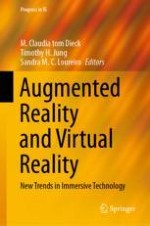2021 | OriginalPaper | Chapter
A Virtual Reality Framework for Upskilling in Computer Programming in the Business Context
Authors : Ernest Edifor, Alasdair Swenson, Opeoluwa Aiyenitaju
Published in: Augmented Reality and Virtual Reality
Publisher: Springer International Publishing
Activate our intelligent search to find suitable subject content or patents.
Select sections of text to find matching patents with Artificial Intelligence. powered by
Select sections of text to find additional relevant content using AI-assisted search. powered by
